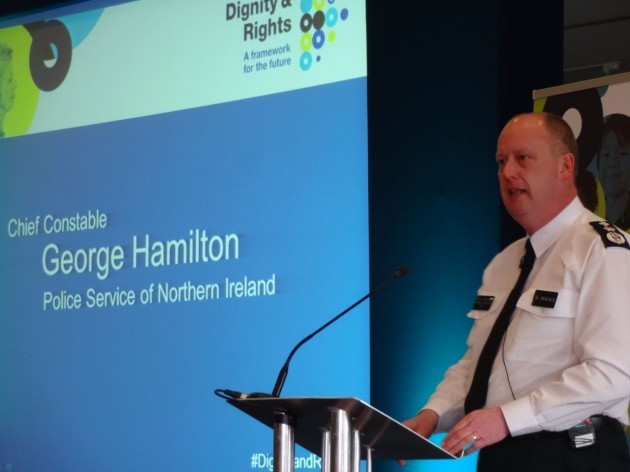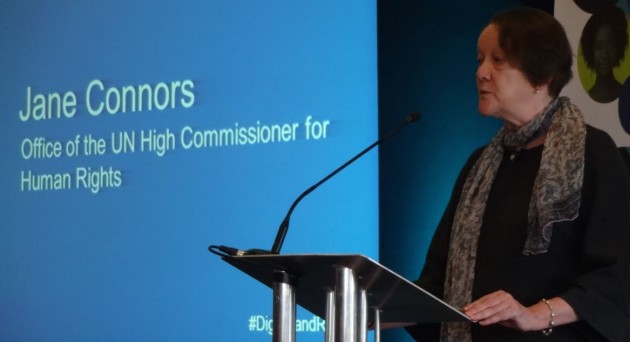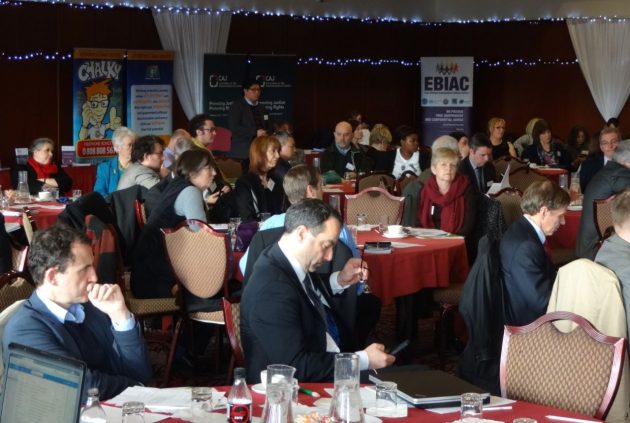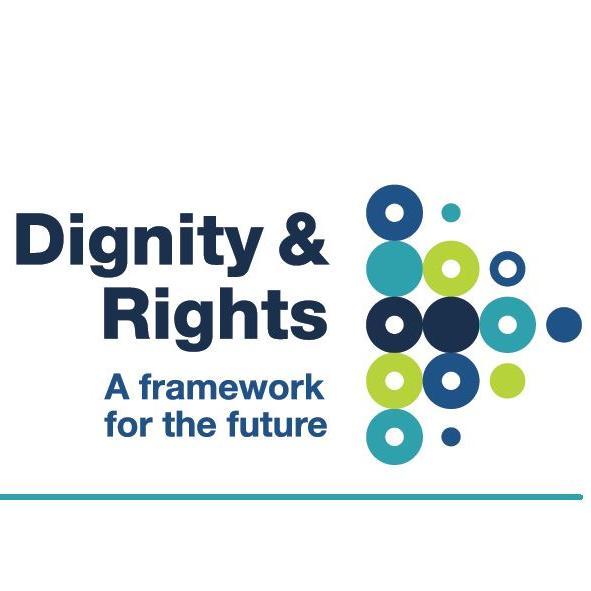What is Northern Ireland’s vision for progressing and protecting human rights in Northern Ireland in the years ahead? How do the principles of participation, accountability, transparency, dignity and equality underpin human rights?
Dignity and Rights: A framework for the future is a two day conference running in the Stormont Hotel in East Belfast, jointly hosted by a variety of organisations who have worked on human rights and equality issues in Northern Ireland for many years: Age NI, CAJ, Children’s Law Centre, Disability Action, Human Rights Consortium, and NICEM.
Thursday morning opened with a short video featuring Bertie Atkinson and the heart-rending story of Carla (whose in-school physio was withdrawn in the lead-up to her transfer test, threatening her right to education). The other clips used during the conference are also online.
Alan McBride opened the conference with his personal reflection on the theme of dignity and rights.
PSNI Chief Constable George Hamilton endorsed the “human focus” of the conference. He reminded the audience that “human rights were built into the foundations of the PSNI by the Patten Report, which astutely observed that ‘upholding human rights and upholding the law should be one and the same thing’”. [full speech]
Human rights guide the decisions we make and the operational activity we undertake. Whether considering use of force, or when deliberating over budget cuts, our organisation will always first look to our obligation to keep people safe and our commitment to uphold the fundamental rights of the individuals and communities that we serve.
Every PSNI officer makes a commitment to human rights when they take their oath of office. Protecting human dignity and upholding the human rights and fundamental freedoms of people are also woven into the PSNI Code of Ethics.
 What other chief constable of a UK police force would use the language and rationale of human rights so easily as a leader of the PSNI? George Hamilton explained that policing was not just about ‘what’ was done, but ‘how’ it was done.
What other chief constable of a UK police force would use the language and rationale of human rights so easily as a leader of the PSNI? George Hamilton explained that policing was not just about ‘what’ was done, but ‘how’ it was done.
For PSNI, keeping people safe is what we do; Policing with the Community is how we do it. Policing with the Community is about understanding the human impact of policing and is underpinned by human rights principles.
Accountability was of “critical importance” and “essential to building trust and public confidence in policing”. Following his speech the Chief Constable was travelling to the monthly public meeting of our Policing Board.
Although sometimes uncomfortable for me as Chief Constable, the ability to have such debates in an open and transparent arena can only be beneficial to policing.
He spoke of his “desire is to have a policy of complete transparency about police work except when there are very real reasons to prevent it … this is a priority for me as Chief Constable”.
This is not just about the publication of our policies and procedures; it is about telling our story. As police officers and staff we need to be ready to engage and work with our partners in the public, private and voluntary sector; and we need to embrace opportunities to communicate with the public through traditional and new media.
Collaborative decision making – based on human rights – was also required.
In my experience, decisions that are made in partnership last longer, produce greater results thereby improving public confidence. This type of collaborative decision making is important at every level of the organisation – whether it is between the Chief Constable and the Policing Board; between a local Commander working with their local community in planning for a safe parade and protest; or a neighbourhood team working with a group of local schools on a drugs education programme for young people …
One of the outcomes that you are seeking from this conference is to enable a partnership approach based on how we take human rights forward as a society … We need to think more radically about how we respond to the needs of the most vulnerable in our community. By working better in partnership across public, private and voluntary sectors, we can improve the support we provide to the most vulnerable in our community and save money by reducing demand across public services. Achieving this requires more joined up working, substantially improving information sharing among agencies and encouraging teams of professionals from different backgrounds to work together to solve the problem rather than just react to it.
On the human rights aspect of policing the dissident threat …
My officers and staff are continuing to deliver a policing service while a small, but dangerous number of violent dissident republicans are actively planning attacks on police. While the police and security services remain the main target, their actions have shown total disregard for the lives of our community.
PSNI’s response to policing this threat is based on a measured, focussed human rights approach. It applies to both our overt and covert policing. For example, in planning an intelligence led operation – our objectives are the protection of the community and putting criminals before the courts. But in planning how we achieve our objectives – we consider the human rights implications for all affected by the operation – this includes members of the community, the suspected criminals targeted by the operation and the police officers involved in implementing the operation.
The often untold story of the professionalism and bravery displayed by my officers, in the most challenging and dangerous of circumstances, is something that I am incredibly proud of. They display a dignity and respect for human life that is entirely absent in the actions of those who are willing to take life.
These people who advocate the use of violence look for perceived failures in policing in order to garner community support.
Our policing history has taught us a lot. Whilst we are seeking to protect life, we understand that police actions (and at times inactions) can have a negative impact on community trust in policing. Real or perceived, the inappropriate or blunt use of police powers such as stop and search; vehicle check points; and house searches can cause unease, anger and distrust in the community. Human rights are all the more important in such challenging circumstances.
Extensive accountability mechanisms also provide community reassurance that we will be held to account for this incredibly difficult area of policing. No such accountability exists for those who chose to use violence. I would therefore appeal to those of you gathered here today to ensure that the public discourse on human rights challenges terrorist actions robustly. Civic society has a powerful voice that can and must be heard in rejecting the use of violence against my officers and the community.
On balancing human rights George Hamilton said that “striking a balance between competing rights and interests in a free and democratic society” was “one of the greatest challenges facing any practitioner of human rights”.
The challenge for my organisation, charged with the delivery of policing in a peace building society, is that the perception of policing can very quickly become divorced from the reality at a huge cost to community confidence.
As was observed in the research on the flags protests published yesterday by Queens University, police actions can be understood by communities in very different ways. The result of the flag dispute has been that some within the loyalist community believe they were the subject of PSNI “brutality”. Conversely, some within the republican community believe that PSNI allowed illegal loyalist protests and the issue has been the result of legal challenge.
There is no doubt that the flags protests were a challenging time for everyone in our society – and there are lessons to be learned for everyone – including policing. The reality is that community tensions continue to play out on our streets on a nightly basis …
Human rights should not be arbitrarily used as a tool for one individual or community to exert power or influence over another. People should not focus only on their own rights and other people’s responsibilities; people must begin to consider the impact of their actions on others.
The Chief Constable said that “in a society where space, symbols and history remain contested, trust in policing, which takes time and effort to win, can quickly and easily be eroded”.
Some people talk of a “dark side” to the PSNI; while others believe there has been a “greening” of the PSNI. As senior officers we could be expected to take a wry comfort that if we are annoying both ends of the political spectrum in equal measure, then we must be demonstrating impartiality. But the reality is that there is no comfort in the fact that community trust in policing is eroded by the perception held by some people that PSNI police one community differently to the other. Let me be clear – this perception is wholly inaccurate.
My officers and I may wear a dark green uniform but the Police Service I lead is neither “dark” nor “green” nor “orange” for that matter … Ill-informed or erroneous commentary from those in leadership can fuel inaccurate perceptions and erode trust, not just in policing, but in the vision of a safe, confident and peaceful society that we are all working towards. This is not to say that policing cannot be criticised or held to account for our actions.
Finally, he spoke about policing the past.
This conference is examining dignity and rights as a framework for the future. But, to talk about the future, our society also has to be ready to talk about the past. The absence of a holistic approach to dealing with our past has left a landscape of legal processes to address the pain caused by Northern Ireland’s troubled history.
The public services of today are not suitably constructed or resourced to deal adequately with the pain of our past. Delay has been a chronic feature of the current piecemeal approach to our past and it is failing to treat those who have suffered with the dignity they should be guaranteed. Unless an alternative solution is found, very regrettably, delays will increase as the impact of the budget cuts continue to take their affect. Indeed, I will be discussing this very issue with the Policing Board later today.
I am conscious that there is a perception among some of those who have been hurt by the past, that the Police Service does not understand the human impact of delay in dealing with the past. This is simply not true. I know that for many people who have suffered, the past is the present as they live everyday with the pain of their loss. Delay not only increases hurt; it also erodes trust in the PSNI’s ability to deal with the past; and causes huge damage to public confidence in policing in the present day.
The reality is that reaching a solution lies well beyond the remit of policing. There is a need for a coherent approach that complies with legal obligations but also guarantees the rights and dignity of those who have suffered. I do not underestimate the scale of this task. Agreeing a more societal approach will require brave conversations such as those our politicians are involved in at present; as well as the conversations that you will have over the next two days at this conference.
 Jane Connors – Director of Research and Development Division of the Office of the UN High Commissioner for Human Rights – spoke next.
Jane Connors – Director of Research and Development Division of the Office of the UN High Commissioner for Human Rights – spoke next.
While both Junior Minsters had originally been due to address the conference, Jonathan Bell pulled out (reason unknown) and Jennifer McCann apologised for her rushed speech and immediate departure citing discussion about dealing with the past in the talks on the other side of the Newtownards Road … talks which have been ongoing for six weeks now.
It was noted that although the Equality Commission had been invited to the conference, no one was in attendance. Despite their anxiety to be heard in the public square, I spotted no one in attendance from local church denominations.
Monica Wilson from Disability Action made her first public speech in two years after illness as she looked at the role of civil society in promoting dignity and humanity.
Give to every human being the rights you claim for yourself.
She noted how the civil rights movement had highlighted the low rate of employment of Catholics but had ignored the even worse plight of those with disability. How long had it taken for churches to become accessible? Where was the equality around organ transplants for disabled patients?
Monica made a plea for more education and training on what human rights actually means. “Sometimes humanity is forgotten … basic humanity and dignity”. She finished by reiterating her mantra on how she deals with other people’s views of her disability:
It’s not my fault; it’s your fault.
Monica’s speech is well worth a listen.
A panel of Monica Wilson, Alan McBride and Jane Connors answered questions before breaking for lunch.
 The conference continues this afternoon with a session on participation, accountability and transparency with speeches by:
The conference continues this afternoon with a session on participation, accountability and transparency with speeches by:
- Les Allamby (the new Chief Commissioner at the NI Human Rights Commission);
- Nicola Browne (Participation and the Practice of Rights/PPR);
- Edel Quinn (Age NI).
On Friday morning, the focus shifts to equality and dignity, before an address by the UN senior expert and EU special advisor Thomas Hammarberg on “Human Rights law and Human Beings: making the connections”. The international dimension continues with Dalile Antunez (Civil Association for Equality and Justice/ACIJ in Argentina) and Biraj Patnaik (India Supreme Court Commission) and Sindi Blose (Treatment Action Campaign/TAC, South Africa).
The Lord Chief Justice, the Rt Hon Sir Declan Morgan will address the conference on Friday afternoon (around 2.30pm) on the importance of the law in protecting dignity and rights.
You can follow the conference on twitter using the hashtag #DignityAndRights.
Alan Meban. Tweets as @alaninbelfast. Blogs about cinema and theatre over at Alan in Belfast. A freelancer who writes about, reports from, live-tweets and live-streams civic, academic and political events and conferences. He delivers social media training/coaching; produces podcasts and radio programmes; is a FactCheckNI director; a member of Ofcom’s Advisory Committee for Northern Ireland; and a member of the Corrymeela Community.
Discover more from Slugger O'Toole
Subscribe to get the latest posts to your email.
